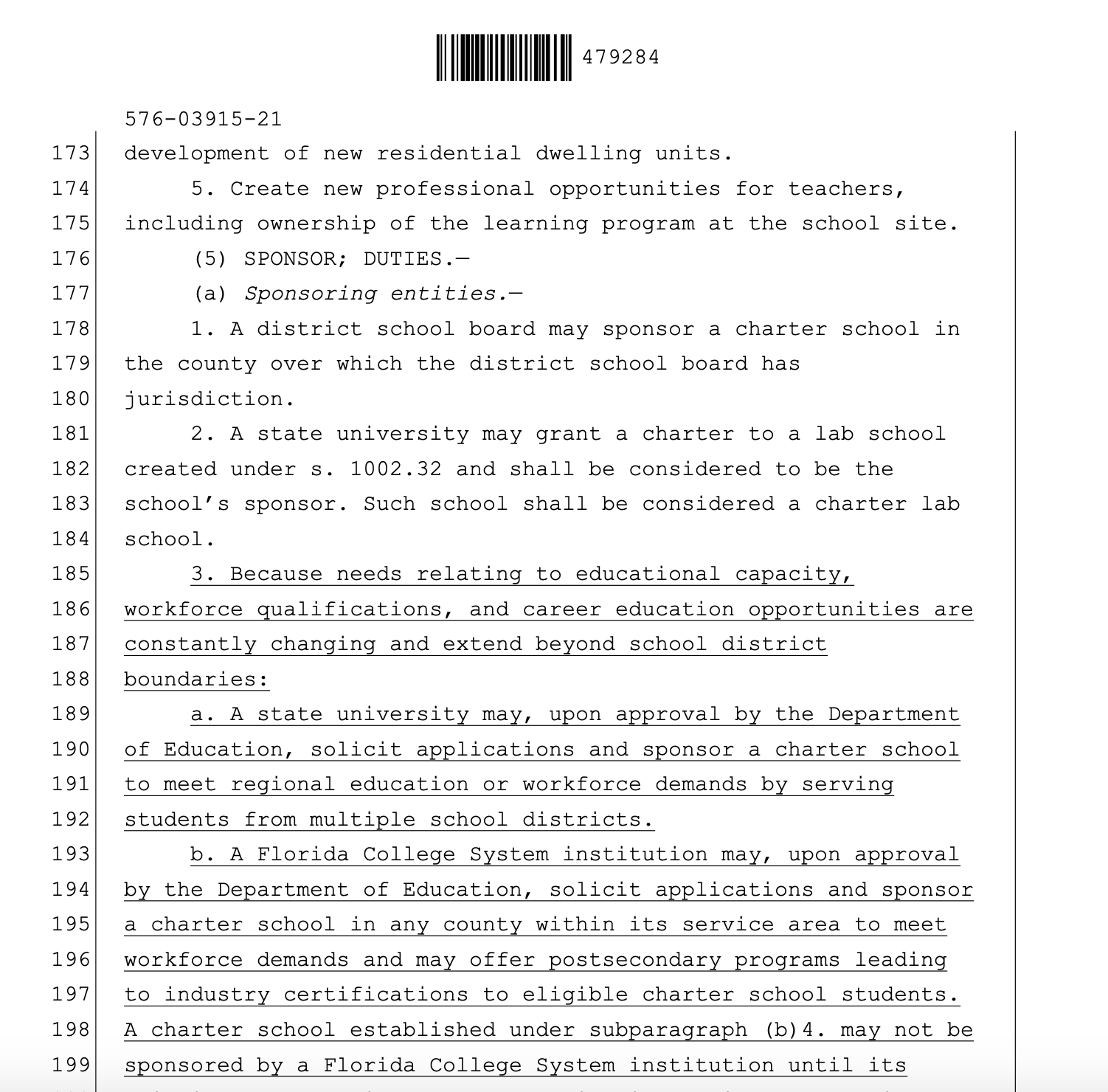Combining Term Limits and Charter School Authorizers into HB51 Makes it Doubly Unconstitutional.

Yesterday, 4/13/21, a Proposed Committee Substitute for CS/HB 51 was filed by the House Education and Employment Committee (EEC). The resultant bill is scheduled to be heard tomorrow, 4/15/21, in the EEC meeting. In short, the Proposed Committee Substitute makes HB51 TWICE as unconstitutional as it previously was…
Over the years, the Florida Legislature has had some pretty notorious education bills pass through its chambers but the audacity of this proposed committee substitute takes the cake: it takes two provisions requiring amendment of the Florida Constitution (alternate charter school authorizers and school board term limits) and combines them into one simple bill, ignoring the amendment process altogether. In doing so, HB51 attempts to bypass the voters, and pass the contents of the 2018 Constitution Revision Commission’s ill-fated Amendment 8, with a straight floor vote. It is an audacious move, even for Florida.
Unlike 2018’s Amendment 8, which hid the radical authorizer intent behind more palatable term limits language, HB51, when initially filed, made its attempt clear. The original bill called for allowing state universities & Florida College System institutions to sponsor publicly funded charter schools, which currently falls under the constitutional responsibility of local, duly elected school boards:
Article IX Section 4 (b) – “The school board shall operate, control and supervise all free public schools within the school district and determine the rate of school district taxes within the limits prescribed herein.”
This is the third year in a row that university authorizer language has been brought before the Legislature, and during that time it has never had support from the state college or university system. The obvious goal here is to create a state wide, alternate charter school authorizer, something that has been attempted (and failed) many times. Prior to these “university authorizer” bills, however, those attempts were made through the process for amending the Florida Constitution.
In 2016, Rep. Manny Diaz Jr. filed HJR759 which directed the State Board of Education to establish “a statewide charter school authorizer to authorize, operate, control and supervise charter schools,” exempting those charter schools from their local school board’s authority. HJR759 made it through the committee process and died on 2nd reading. The senate companion that year, Senator Kelli Stargel’s SJR976, was temporarily postponed at its first committee stop and never re-heard.
In 2017, Constitution Revision Commissioner Erika Donalds, a one-term Collier County School Board member who now establishes Hilsdale College Barney Classical charter schools through her Optima Foundation, was the author of 2018’s ill fated Amendment 8, which combined school board term limits and civics education with deceptively worded alternate charter authorizer language. Amendment 8 was ultimately removed from the ballot because it attempted to hide the authorizing language behind school board term limits (we wrote about it here and here).
If HB51 passes and a statewide authorizer were to be created via the university system, charter school chains (like Donald’s Hilsdale College Barney Classical charter schools or the charter schools run by Manny Diaz’s for-profit employer, Academica, perhaps?) could shop around for an authorizer, avoiding the oversight of their elected school boards, and pick the authorizer, funding source and accountability system, that “best suits their needs,” creating yet another parallel system of publicly funded schools, despite the constitutional mandate for a “uniform system of free public K-12 schools.”
The proposed committee substitute for HB51 adds school board term limits to the alternate charter school language, making the House bill doubly unconstitutional. There can be no doubt that House leadership understands that a constitutional amendment is required to enact school board term limits because PCS for CS/HJR 1461, which now proposes “an amendment to Section 4 of Article IX and the creation of a new section in Article XII of the State Constitution to limit the terms of office for members of a district school board,” is also on the 4/15/21 EEC agenda. HJR1461 was originally filed as a proposed constitutional amendment to eliminate school board salaries, which was believed to be a “back door” to term limits. The new PCS for CS/HJR1461 eliminates the salary language, replacing it with school board term limits – something the House (but not the Senate) has been willing to pass several times during the last few sessions.
On the Senate side, the alternate charter authorizer bill, SB1028, is (currently) traveling separately from term limits. [Interestingly, the Senate term limit bill, SJR1642, was filed by Education Chair, Joe Gruters, who neglected to hear it in his committee.]
Senator Travis Hutson is the sponsor of the Senate’s Alternate Charter Authorizer bill, SB1028. Rumor has it, Senator Hutson is concerned that his bill is unconstitutional. Conveniently, when it was heard in Senate Education Appropriations on 4/8/21, Hutson was absent, leaving co-sponsor, Senator Manny Diaz Jr, to present the bill. Diaz suggested the bill’s alternate charter authorization language was a simple expansion of current statute involving University lab schools. This is “simply” not true. SB1028 does amend the statute (1002.32) concerning Developmental research (laboratory) schools to allow universities to establish a lab school, associated with the university’s college of education, to serve families at a military installation. [Of interest, the House bill, HB51, was originally amended to specifically allow Florida State University to open a lab school at Tyndall Air Force Base.] The creation of the lab school at Tyndall has nothing to do with the alternate authorizer language. Despite what Diaz implied, the controversial alternate charter school language is not in an amendment to f.s.1002.32 (lab schools) but rather under f.s.1002.33: Charter Schools. The bill CLEARLY adds a third sponsor, or authorizer, to the list containing district school boards and university sponsored lab schools.

Diaz appears to be hoping he can dazzle senators with lab school language and they will ignore the bill’s assault on the constitutional authority of elected school boards. This attempt to “hide the ball” is VERY reminiscent of Amendment 8. SB1028 is waiting to be heard in Senate Appropriations and, at this moment has not been amended to include term limits.
Will the Florida Legislature be willing to bypass the voters, ignore the constitutional issues, create an Alternate Charter Authorizer and enact School Board Term Limits all in one simple bill? It is audacious… it is deceptive… it is unconstitutional… but, then again, this is Florida…

One Comment